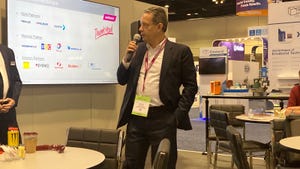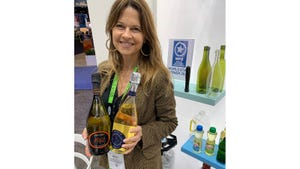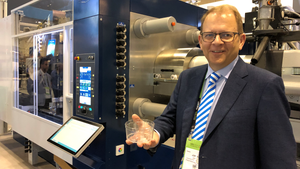Education And Training Attract More Resources And Students
April 30, 2003
Italy has one of the strongest plastics machinery sectors in the world, a rich heritage in thermoplastics, polyurethanes, and compounds, and a thriving processing sector. How it continues to manage this achievement is something of a wonder because today, only one Italian university offers full-time courses leading to a plastics engineering degree.
The Italian academy has a long and illustrious history in most fields of study, but when it comes to plastics, it is the proverbial "ivory tower" - strong on theory, poor on practice. There is a lack of establishments offering vocational training in plastics for operators and technicians. Only a handful of technical institutes offer diploma courses geared to plastics, while training centers for those in the industry are equally scant.
Cesap (Center for the Development of Plastics Applications), near Bergamo, Italy, is affiliated with Assocomaplast, the Italian machine makers federation. Cesap is the only independent operation providing educational and technical services to the processing industry receiving no regional or public subsidies. Cesap offers basic and advanced courses, and does research and laboratory analysis. Demand for its services is relatively moderate. According to Claudio Cellata, director of Cesap and Assocomaplast, around 400 companies send employees to the center for training each year.
Meanwhile, Laboratorio di Impresa was set up in Correggio, near Parma, six years ago with public and private funding, to do research and provide technical and management support for processors, of which there are many in the region.
Across the Italian plastics industry, companies have provided their own education and training in a time-honored way: learning by example. Clearly, this method works. Says Cellata: "The Italian training system is very different from the French one, which is supported by a law that binds companies to pay a small percentage on wages for training, and from the German one, where there is a traditional and deep cooperation between university and industry."
Cellata, however, does not reckon Italian processors are at that much of a disadvantage vis-à-vis their French and German counterparts. "It is true that plastics education is a bit lacking in Italy, but the great majority of processors in Europe, the U.S., and the rest of the world have a knowledge of raw materials and machines that is well below the level needed to fully exploit production. Cesap is obtaining good results, but it is true that in Italy we lack the advantages of France and Germany."
With its "Plastic Net" project, Laboratorio di Impresa created a network linking companies and research centers, covering training and services for the industry. "This project has [promoted] meetings to discuss materials, technologies and production processes, customized training programs, online consulting, and training courses for company tutors," says director Alex Bonardi.
"Networking has proved a highly effective approach, and Laboratorio di Impresa was one of the promoters behind the creation of a European network which brought together various research centers dedicated to assisting small and medium-sized enterprises in plastics."
Laboratorio di Impresa recently began the "PlasMa" research project, in collaboration with the University of Modena/Reggio Emilia and the University of Naples. It sets out to "rationalize some of the factors which affect the quality of products, with the recycling constraint firmly in mind," notes Bonardi. Evaluation of the effects of using recyclate blended with virgin material, and the use of coinjection technology, are the two main phases of this research project.
Turin Polytechnic"s Center for Engineering of Plastic Materials was launched in Alessandria in May 1998, and now has a staff of 36 (full-time and part-time). It is increasingly working on an international level, doing consulting work for clients in Belgium, France, and Germany, for example.
Four years ago, the center launched Italy"s first degreed plastics engineering course. Since 1996, Turin Polytechnic has run various engineering courses containing blocks devoted to plastics, but this is the first time it has made plastics the core element of a degreed course. There are now 30 students enrolled, and 35 in the class behind them. Piero Cavigliasso, the center"s director, says most have already secured employment.
The center was founded with the backing of Proplast, a training and applied research consortium that initially comprised two major packaging companies headquartered nearby — M&G, in Tortona, now also a big pet supplier, and Guala Closures, in Alessandria. Proplast also included two materials suppliers — Bayer and Montell (now Basell). Proplast has since attracted over 40 more companies from across the Italian plastics industry, and its initial budget of around €200,000 has risen to €1.8 million.
The center originally consisted of two parts, one for training and the other for services and consulting. Services range from basic laboratory analysis to projects on materials and processing technology. It has a chemical laboratory that includes a scanning electron microscope, as well as a technology lab with a growing array of processing and related equipment for such work as mold proving and process optimization. A lab specializing in process and product design using simulation and design software and prototyping equipment was added last summer.
The center conducts various courses, ranging from those for high-school students to day courses for professionals. But with problems attracting students for some courses such as mold maintenance, the center sometimes pays students to attend. It also does distance learning; it has adopted a course originally developed by the University of Mississippi, which is available at its Web site (www. cdcmp.it) and on a free cd-rom. (The English version can be accessed through the University of Mississippi"s Web site, www.olemiss.edu.)
The technology laboratory is well stocked with equipment loaned by suppliers. It splits time between consulting work and education. The first two injection machines there were from non-Italian suppliers — Demag Ergotech and Husky Injection Molding Systems — but local companies willing to loan equipment are now emerging. Piovan has supplied auxiliaries, an injection machine from Mir is on the way, and two Bausano extruders have been installed. Also available is a compounding line from German supplier Leistritz.
The center also provides expertise in polymer degradation (during processing, by weathering, etc.) and fire retardancy. There are projects running on nanocomposites, and it is developing projects on painting plastics. It is even planning a small plastics technology museum in Alessandria, called Materioteca, in collaboration with Milan-based consultant Plastic Consult and the Domus Academy, a post-graduate training center with roots in design and fashion.
You May Also Like


